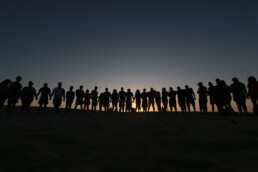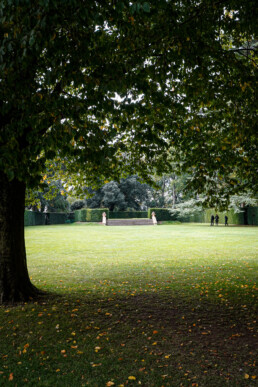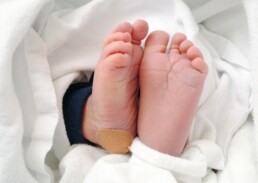Forging a New Path Toward Justice
This post originally appeared in the PLACES Connection April 2022 newsletter.
BY Talissa Lahaliyed, Equity Programs Manager
“Sometimes we have to do the work even though we don’t yet see a glimmer on the horizon that it’s actually going to be possible” – Angela Davis
I’m writing this message as I prepare (physically and spiritually) for the month of Ramadan, which this year takes place from April 2 to May 2. Ramadan is not only a month marked by fasting and worship, but it is also one of deep self-reflection, community care and humility.
I began to reflect on my purpose, which is something I’ve battled with since I began my career in philanthropy, particularly in my pursuit of justice and liberation. My purpose is guided by my faith, which has instilled in me a strong sense of justice and resistance to oppression.
However, the overwhelming inequities we see in the world accompanied by slow change has at times left me paralyzed by helplessness. It also made me question my approach to the work. Am I doing enough? Am I truly making an impact? Though I recognize many of these thoughts are derived from white supremacy culture and capitalism, there is validity in pausing, contemplating our intentions and re-routing our path.
While I am yet to find the answers to my questions, I have come to the conclusion that doing nothing is never an option. And knowing that I am not alone in this pursuit of justice and liberation, and that there are remarkable individuals leading the way for change, has brought me comfort and hope. All change might not happen in our lifetime, but we must follow in the footsteps of those who came before us and forge a new path toward justice.
Working in this sector is a privilege, and being unable to act is a disservice to our communities. I will continue my reflections and give myself some grace, with the hope that I will come closer to a resolution by the end of Ramadan. I also encourage you to think about your purpose, as a means to guide us and hold us accountable in our fight for liberation for all.
About PLACES
PLACES — which stands for Professionals Learning About Community, Equity and Sustainability — uses learning, coaching and reflections to explore structural racism, community empowerment and equitable grantmaking practices. In addition to the PLACES curriculum, Fellows learn from the people and places we visit. Our Fellowship Cohort, selected annually from a highly competitive pool of applicants, embarks on year-long journey that includes four site visits to communities across the U.S. and Canada.
The PLACES Fellowship concludes with a capstone presentation and graduation — but that rarely marks the end of the PLACES experience. As any PLACES alum will tell you, the deep bonds and professional connections forged by the Fellows extend well beyond the end of their cohort year. Learn more about the PLACES fellowship and alumni here.
About the Author
 Talissa Lahaliyed is TFN's equity programs manager, responsible for supporting the implementation of TFN’s Racial Equity Action Plan and contributing to the design and implementation of the PLACES Fellowship program, including alum engagement.
Talissa Lahaliyed is TFN's equity programs manager, responsible for supporting the implementation of TFN’s Racial Equity Action Plan and contributing to the design and implementation of the PLACES Fellowship program, including alum engagement.
Photo by kordi_vahle is licensed under CC BY-NC-SA
Greeting the New Year with Grace
This post originally appeared in the PLACES Connection January 2022 newsletter.
BY Dion Cartwright, Director of Equitable Initiatives and Leadership Development
As I kicked off 2022, I began to reflect on the past year and wondered to myself, where did the time go? Last year truly felt like a blur. In some ways I felt like I accomplished a lot. In other ways I felt like I didn’t do enough. I started to wonder whether I made the best use of my time. Did I achieve my goals? Did I check off some boxes? What the heck did I do the past twelve months? How many of you can relate?
Then I paused. I thought to myself, I survived. After a traumatic year of grief and heartache, a global pandemic and civil unrest, I reminded myself that 2021 was about healing, it was about staying healthy, it was about humanity, it was about finding joy again. I had to show myself a bit of grace.
Grace is defined as “courteous goodwill.” Imagine if we approached this new year — or better yet, each day — by offering grace to ourselves, to our coworkers or employees, to our grantees, to the communities we serve. It literally would change the culture in which we often operate. In 2021, as part of our equity journey, TFN worked to understand the characteristics of white supremacy culture and how it shows up within our organization. It’s a process and we still have work to do. But recognizing how we often uphold these characteristics, often unconsciously, is a step in changing these unhealthy norms and behaviors that have created a culture that lacks care, humanity and grace. When we lack grace, we perpetuate a negative and toxic environment that is often reflected in the work of our organizations and in the way in which we engage with community and with one another.
As you reflect on your past year and lay the groundwork for the new year, I challenge you to offer yourself and others a bit of courteous goodwill. Know that you have the power to change how YOU approach each day. Every step we take in dismantling white supremacy culture in our work and in our lives is a step toward a more equitable and just society.
We all need a bit of grace in our life so you might as well start with you!
About PLACES
PLACES — which stands for Professionals Learning About Community, Equity and Sustainability — uses learning, coaching and reflections to explore structural racism, community empowerment and equitable grantmaking practices. In addition to the PLACES curriculum, Fellows learn from the people and places we visit. Our Fellowship Cohort, selected annually from a highly competitive pool of applicants, embarks on year-long journey that includes four site visits to communities across the U.S. and Canada.
The PLACES Fellowship concludes with a capstone presentation and graduation — but that rarely marks the end of the PLACES experience. As any PLACES alum will tell you, the deep bonds and professional connections forged by the Fellows extend well beyond the end of their cohort year. Learn more about the PLACES fellowship and alumni here.
About the Author
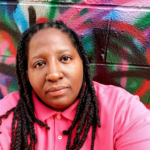 Dion Cartwright is TFN's senior director of equity initiatives and leadership development, directing the PLACES Fellowship program and leading the organization’s work to address equity, inclusion, and structural racism. She was a 2010 PLACES Fellow and chaired the PLACES Advisory Board for four years before joining TFN's staff.
Dion Cartwright is TFN's senior director of equity initiatives and leadership development, directing the PLACES Fellowship program and leading the organization’s work to address equity, inclusion, and structural racism. She was a 2010 PLACES Fellow and chaired the PLACES Advisory Board for four years before joining TFN's staff.
Photo by ninosouza is licensed under CC BY-NC-SA
Prioritize Your Humanity
This post originally appeared in the PLACES Connection September 2021 newsletter.
BY Dion Cartwright, Director of Equitable Initiatives and Leadership Development
In these recent months, and honestly this past year, I’ve discovered the power of saying no.
If you know me, you know it’s not something that comes easily. I tend to do everything in my power to say yes, to help a friend, colleague, or family member. One thing that 2020 taught me was that I needed to choose me first sometimes. That I needed to be mindful of my own physical and mental wellbeing. It was a year that reminded me that in order to do for others, I had to do for myself. I know it sounds cliché, but we all know it’s much easier said than done.
As a Black woman, I was taught early in my life that I needed to be a super woman. Sacrificing my own mental and physical health for others. I didn’t learn this through words someone told me, but through what I observed from my mother, my grandmother and so many others who influenced my way of thinking. We’re shown a level of resilience that few could ever match. We’re shown how to choose others over ourselves, how to be mentally stronger than everyone else, how to be a big rock even when you’re feeling like a pebble. All of this, often for a capitalist American system that puts us at the bottom of the totem pole.
The conversation about mental health has increased as we battle an ongoing pandemic and continue to confront, challenge and process systemic injustices. Celebrities and athletes from across the globe are also opening up about their own mental health struggles, like Naomi Osaka, Simone Biles and Meghan Markle, to name just a few.
We need folks in philanthropy to honestly address mental health in our own sector, especially the often-ignored traumas endured by our BIPOC colleagues. We talk about being responsive to the needs of communities of color in our grantmaking, but sometimes forget that BIPOC folks in philanthropy are part of those very same communities, and that they — along with their loved ones — are often on the frontlines of the crises we are working to address.
We also lack honesty about the white supremacist culture that exists within philanthropic institutions and how that culture causes harm, causes trauma, and often forces those individuals to leave philanthropy all together. We are at a place where this behavior should no longer be acceptable. We need our white peers, and white leaders in particular, to begin prioritizing and normalizing the mental and physical health and wellbeing of BIPOC individuals. Encourage selfcare. Support the use of vacation time. Remind folks that they are worthy of being valued, being cared for, taking a deep breath, resting.
We must prioritize humanity. That’s love.
About PLACES
PLACES — which stands for Professionals Learning About Community, Equity and Sustainability — uses learning, coaching and reflections to explore structural racism, community empowerment and equitable grantmaking practices. In addition to the PLACES curriculum, Fellows learn from the people and places we visit. Our Fellowship Cohort, selected annually from a highly competitive pool of applicants, embarks on year-long journey that includes four site visits to communities across the U.S. and Canada.
The PLACES Fellowship concludes with a capstone presentation and graduation — but that rarely marks the end of the PLACES experience. As any PLACES alum will tell you, the deep bonds and professional connections forged by the Fellows extend well beyond the end of their cohort year. Learn more about the PLACES fellowship and alumni here.
About the Author
 Dion Cartwright is TFN's senior director of equity initiatives and leadership development, directing the PLACES Fellowship program and leading the organization’s work to address equity, inclusion, and structural racism. She was a 2010 PLACES Fellow and chaired the PLACES Advisory Board for four years before joining TFN's staff.
Dion Cartwright is TFN's senior director of equity initiatives and leadership development, directing the PLACES Fellowship program and leading the organization’s work to address equity, inclusion, and structural racism. She was a 2010 PLACES Fellow and chaired the PLACES Advisory Board for four years before joining TFN's staff.
Photo by PhotoMIX-Company is licensed under CC BY-NC-SA
Taking Time to Breathe
This post originally appeared in the PLACES Connection December 2022 newsletter.
BY Sheena Solomon, PLACES Advisory Board Chair
As many of us know, the last few years have not been the easiest; however, they’ve come with opportunities, challenges and small wins. As we all enter into a new year with new challenges, new opportunities and new wins, I encourage everyone to take time to breathe.
As I continue my leadership journey, I have realized the importance of breathing, the importance of being, and not always doing. Life has us on roller skates, just going and going all the time. Not taking time to celebrate small wins, birthdays and anniversaries. Not taking the time to take a real vacation and just enjoy family or alone time. They say, “don’t put for tomorrow what you can do today,” but I say, “don’t get consumed by fake urgency.” Time waits for no one, so don’t say, “Oh, I’ll take a vacation next year,” or “I’ll go visit that family member another time,” because the work will always be here, but there is no promise that you will be here to do it.
The message is to take time for yourself, your family, your friends, and those who love you because they are the reason you do the work. Take time out to breathe…
About PLACES
PLACES — which stands for Professionals Learning About Community, Equity and Sustainability — uses learning, coaching and reflections to explore structural racism, community empowerment and equitable grantmaking practices. In addition to the PLACES curriculum, Fellows learn from the people and places we visit. Our Fellowship Cohort, selected annually from a highly competitive pool of applicants, embarks on year-long journey that includes four site visits to communities across the U.S. and Canada.
The PLACES Fellowship concludes with a capstone presentation and graduation — but that rarely marks the end of the PLACES experience. As any PLACES alum will tell you, the deep bonds and professional connections forged by the Fellows extend well beyond the end of their cohort year. Learn more about the PLACES fellowship and alumni here.
About the Author
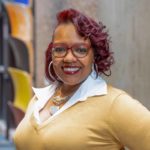 Sheena Solomon is executive director of The Gifford Foundation and vice chair of TFN's Board of Directors. She was a PLACES 2012 Fellow and currently serves as chair of the PLACES Advisory Board and is a member of the Partners for Places Governance Committee.
Sheena Solomon is executive director of The Gifford Foundation and vice chair of TFN's Board of Directors. She was a PLACES 2012 Fellow and currently serves as chair of the PLACES Advisory Board and is a member of the Partners for Places Governance Committee.
"A Space to Breathe" by judy dean is licensed under CC BY-SA
Overcome with Hope and Unconditional Love
This post originally appeared in the PLACES Connection September 2023 newsletter.
BY Talissa Lahaliyed, Equity Programs Manager
“My mother was my first country, the first place I ever lived.” ― Nayyirah Waheed
Three and a half months ago my husband and I welcomed our first baby boy into our lives. The happiness I’ve experienced is immeasurable, but so are my newfound worries for my son’s wellbeing and future.
During countless late-night feedings I found myself thinking about how my son, Mohammed, will navigate this world. How will he treat others and how will he be treated by others? Will he be accepting and accepted? Will he be inclusive and included? And will he be embracing and embraced?
Throughout my career in racial equity, I have strived to dismantle oppressive systems, and nurture spaces that are inclusive and celebrate diversity among our intersectional and multiple identities.

Baby Mohammed's feet at just 2 days old
My “why” has been shaped by my faith, my relentless desire for justice, and by my past encounters with bigotry and discrimination.
Now that I’ve become a mother, my “why” and my purpose has strengthened and shifted. It has become more communal, selfless, and nurturing. I would often catch myself being driven by anger and frustration for injustice and oppression. And while there is nothing wrong with that, love and hope are now at the center of my resolve.
Through unconditional love, I now have the responsibility and opportunity to raise a person that will continue his ancestors’ fight for justice and liberation, breaking down cycles of patriarchal and oppressive norms. We all carry a responsibility of making this world a better place for those who will come after us. Our desire to create change and seek justice should be driven by something greater than ourselves. What’s your ”why”? What's at the center of your resolve?
Unlike the past, when I was paralyzed by helplessness and overwhelmed by inequities, I am now overcome with hope for our future generation of leaders. I am so excited to see what kind of person my little one will become. And I’m ready to watch him experience joy, resilience, and growth in his most authentic self.
About PLACES
PLACES — which stands for Professionals Learning About Community, Equity and Sustainability — uses learning, coaching and reflections to explore structural racism, community empowerment and equitable grantmaking practices. In addition to the PLACES curriculum, Fellows learn from the people and places we visit. Our Fellowship Cohort, selected annually from a highly competitive pool of applicants, embarks on year-long journey that includes four site visits to communities across the U.S. and Canada.
The PLACES Fellowship concludes with a capstone presentation and graduation — but that rarely marks the end of the PLACES experience. As any PLACES alum will tell you, the deep bonds and professional connections forged by the Fellows extend well beyond the end of their cohort year. Learn more about the PLACES fellowship and alumni here.
About the Author
 Talissa Lahaliyed is TFN's Equity Programs Manager, responsible for supporting the implementation of TFN’s Racial Equity Action Plan and contributing to the design and implementation of the PLACES Fellowship program, including alum engagement.
Talissa Lahaliyed is TFN's Equity Programs Manager, responsible for supporting the implementation of TFN’s Racial Equity Action Plan and contributing to the design and implementation of the PLACES Fellowship program, including alum engagement.


